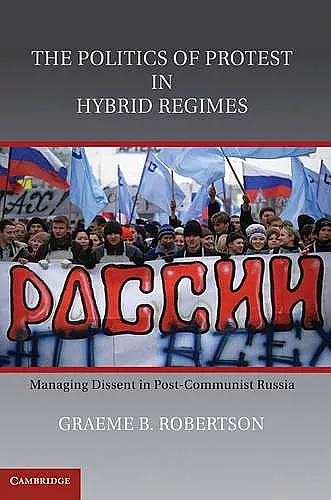The Politics of Protest in Hybrid Regimes
Managing Dissent in Post-Communist Russia
Format:Hardback
Publisher:Cambridge University Press
Published:20th Dec '10
Currently unavailable, and unfortunately no date known when it will be back

This book shows how one high-profile hybrid regime manages political competition in the workplace and in the streets in Russia.
This book builds on unpublished data fieldwork in Russia to show how one high-profile hybrid regime manages political competition in the workplace and in the streets. It develops a theory of how the nature of organizations, state strategies for mobilizing supporters, and elite competition shape political protest in hybrid regimes.Since the end of the Cold War, more and more countries feature political regimes that are neither liberal democracies nor closed authoritarian systems. Most research on these hybrid regimes focuses on how elites manipulate elections to stay in office, but in places as diverse as Bolivia, Georgia, Kyrgyzstan, Serbia, Thailand, Ukraine and Venezuela, protest in the streets has been at least as important as elections in bringing about political change. The Politics of Protest in Hybrid Regimes builds on previously unpublished data and extensive fieldwork in Russia to show how one high-profile hybrid regime manages political competition in the workplace and in the streets. More generally, the book develops a theory of how the nature of organizations in society, state strategies for mobilizing supporters, and elite competition shape political protest in hybrid regimes.
“In this superb study of protest in post-Soviet Russia, Graeme Robertson presents detailed quantitative and qualitative evidence to develop a theory of how regime-type shapes the frequency and character of protest. In the process, he not only undermines widespread stereotypes about the passivity of Russians, but also provides a better understanding of how protest can be functional to the stabilization of a semi-authoritarian regime.” —Mark Beissinger, Princeton University
“By demonstrating that protest in post-communist Russia has been far more prevalent than appreciated, Robertson provides a contrarian answer to one of the great puzzles of the postcommunist transformation: the supposed lack of protest despite wrenching social change. Well-written and closely argued, this work adds greatly to our knowledge of contentious politics and hybrid regimes by showing how elite politics and electoral completion shape the decision to take to the streets. The lessons from this important book apply well beyond the post-communist world.” —Timothy Frye, Columbia University
“Robertson has produced a breakthrough in how we understand mass politics in 21st century hybrid regimes, countries like Russia that combine elements of democracy and autocracy. Exposing as a myth the notion that Russians are generally passive in the face of hardship, The Politics of Protest in Hybrid Regimes explains how and why they mobilize at some times but not others, and spells out implications for regime stability and the possibility of long-run democratization. The book is full of clever insights and combines the satisfying rigor of strong quantitative analysis with the enjoyable nuance of a story told well based on extensive on-the-ground fieldwork and deep country knowledge.” —Henry Hale, The George Washington University
“In The Politics of Protest in Hybrid Regimes, Graeme Robertson has made a substantial contribution to our understanding of the interplay between ruling elites and popular protest in hybrid regimes. Employing a unique set of Russian Interior Ministry reports on strikes and protests in the late Yeltsin period as well as evidence from the Putin era, Robertson demonstrates that three sets of factors—the organizational environment for associations, the strategies used by political elites to mobilize the public, and the nature of intra-regime political competition—explain the variation in the level of popular protest across time and space. Robertson's argument has major implications for a broad range of contemporary regimes.” —Thomas F. Remington, Emory University
ISBN: 9780521118750
Dimensions: 236mm x 165mm x 20mm
Weight: 560g
304 pages